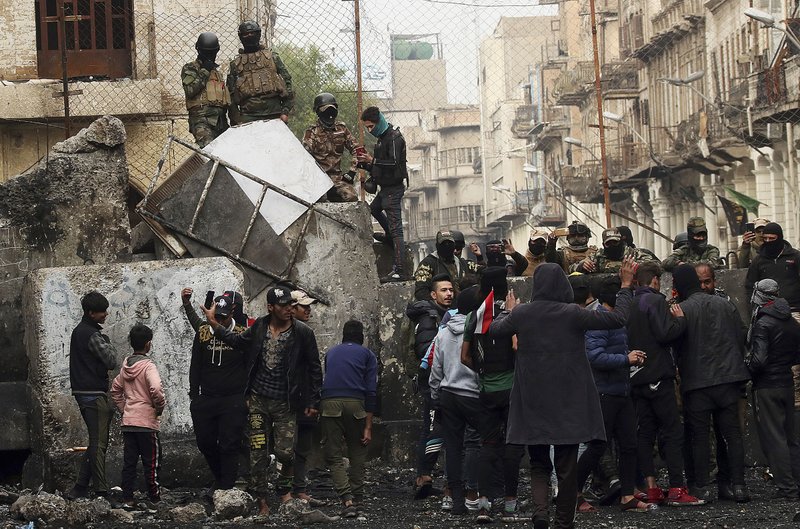BAGHDAD -- Gunmen in cars opened fire Friday in Baghdad's Khilani Square, leaving at least 15 people dead and 60 wounded, Iraqi security and medical officials said. At least two of the dead were policemen.
Protesters fearing for their lives ran from the plaza to nearby Tahrir Square and mosques to take cover. It wasn't immediately clear who did the shooting.
The attack came as anti-government demonstrators occupied parts of Jumhuriya, Sinak and Ahar bridges in a standoff with security forces. All the bridges lead to or near the heavily-fortified Green Zone, the seat of Iraq's government.
"We are under live fire now with electric power cut, the wounded and martyrs are here and the bullets were fired in Sinak Bridge," said one protester, who did not give their name for fear of retaliation.
The attack came a day after a string of suspicious stabbing incidents targeting demonstrators left at least 13 wounded in Tahrir Square, the epicenter of Iraq's leaderless protest movement.
Those attacks by unknown perpetrators occurred as demonstrators supporting political parties and Iran-backed militias withdrew from the square. The incidents Thursday fueled paranoia among protesters, who immediately implemented self-security measures to uncover saboteurs within the square.
Separately, the Trump administration on Friday blacklisted the leaders of three militias in Iraq that U.S. officials said opened fire on peaceful protesters and killed dozens of people.
[Gallery not loading above? Click here for more photos » arkansasonline.com/127iraq/]
The designations of the militia leaders who command groups the United States considers proxies of Iran is part of the administration's campaign to increase sanctions pressure on the country, which supports several Shiite militia in neighboring Iraq.
Since October, at least 400 Iraqi protesters have been killed by security forces responding to the anti-government demonstrations. The protesters have demanded more jobs, an end to corruption and more public services, while denouncing the nation's leadership as beholden to Iran.
"The Iraqi people want their country back," Secretary of State Mike Pompeo said in a statement released after the Treasury Department announced the latest designations. "They are calling for genuine reform and accountability and for trustworthy leaders who will put Iraq's national interests first. Those demands deserve to be addressed without resort to violence or suppression."
The sanctions named Qais al-Khazali and his brother Laith al-Khazali, two leaders of Asaib Ahl al-Haq militia. They also target Hussein Falih al-Lami, security chief for the Popular Mobilization Forces. The Treasury Department named Khamis al-Khanjar, described as an Iraqi millionaire businessman, for alleged corruption.
The designations have more symbolic value than practical impact. They freeze any U.S. assets held by the leaders and prohibit Americans from doing business with them.
The Treasury Department said groups led by the three paramilitary leaders "opened fire on peaceful protests, killing dozens of innocent civilians."
Treasury Secretary Steven Mnuchin called the assaults on protesters appalling.
"Peaceful public dissent and protest are fundamental elements of all democracies," he said. "The United States stands with the Iraqi people in their efforts to root out corruption. We will hold accountable the perpetrators of human-rights abuse and corruption in Iraq."
As waves of anti-government protests have convulsed both Iraq and Iran, the State Department has repeatedly condemned the violence. On Thursday, a senior State Department official said 1,000 or more protesters in Iran may have been killed by security forces.
Pressure from the protest, now in its third month, led to the resignation of Prime Minister Adel Abdul-Mahdi last week after Iraq's powerful Shiite Muslim religious leader, Grand Ayatollah Ali al-Sistani, called for parliament to withdraw its support for his government.
Earlier Friday, Iraq's highest Shiite religious authority called for the formation of a new government within the allotted deadline, and without foreign interference, as the clock ticks down on lawmakers to select a new premier.
"We hope the head of the new government and its members are chosen within the constitutional deadline and according to the aspirations of the people and away from outside influence," al-Sistani said in his weekly Friday sermon in the holy city of Najaf.
Information for this article was contributed by Samya Kullab and Murtada Faraj of The Associated Press; and by Carol Morello of The Washington Post.
A Section on 12/07/2019
